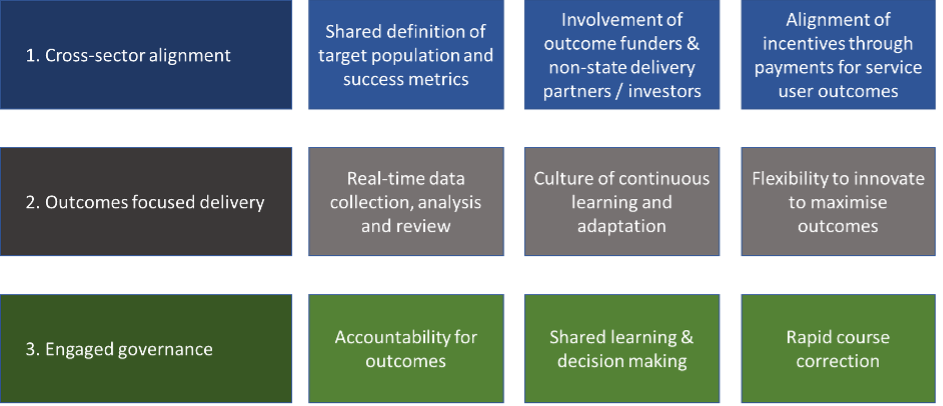Social Outcomes Contracts & System Strengthening
In this blog, Louise Savell, Director at Social Finance, explores the emerging interest in the use of outcomes contracts for systems strengthening, and analyses two pathways through which the model might build the capacity of the wider system.
In this blog, Louise Savell, Director at Social Finance, explores the emerging interest in the use of outcomes contracts for systems strengthening, and analyses two pathways through which the model might build the capacity of the wider system.
The blog builds on insights from Louise’s working paper, Social outcomes contracts & system strengthening - a conceptual framework. You can also hear Louise discuss the framework alongside a panel of expert practitioners at the Social Outcomes Conference on Friday 9 September at 4pm BST, as part of the Big Picture session: The work never stops: how do we make social change stick? Lessons from outcomes-based partnerships and beyond. Find out more in our programme.
As the use of Social Outcomes Contracts (SOC) including impact bonds has expanded, questions have arisen about whether and how timebound, tightly defined social outcomes contracts fit within and could support broader and longer-term capacity building around effective policy implementation at the country and system level.
Supported by the UK’s Foreign, Commonwealth & Development Office (FCDO) Social Finance has partnered with GO Lab to bring lessons from other forms of results-based finance and early thinking from SOC practitioners into a conceptual framework for use by researchers and evaluators, practitioners and governments. The framework focuses on examples from low- and middle-income countries, but also has relevance to higher income country contexts.
Core characteristics of social outcomes contracts
Social outcomes contracts are differentiated from other forms of results-based finance, by the shift in accountability that is created by linking payments to service user outcomes as opposed to inputs or activities. This shift, theoretically, enables scope for greater operational flexibility to deliver contractual outcomes, driven by a focus on continuous learning and adaptation, and underpinned by real-time data.
Building on insights drawn from discussions with over 85 SOC practitioners during the Covid-19 pandemic, the paper proposes three primary characteristics underpinning the resilience and impact of SOCs: cross-sector alignment, outcomes focused delivery and engaged governance. Each of these, in turn, are underpinned by three drivers (Figure 1).

System strengthening pathways of social outcomes contracts
Often, the focus has been on the ability of these factors to drive improved social outcomes for service users. However, discussions among practitioners involved in designing, contracting and delivering social outcomes contracts have been increasingly focused on the ways in which they may drive system strengthening.
The proposed conceptual framework (see full report) aims to support the evaluation and design of future social outcomes contracts, even though the framework, in and of itself, cannot provide answers around whether social outcomes contracts are currently driving system strengthening.
Building on the drivers for resilience and impact within social outcomes contracts, the framework proposes two pathways through which social outcomes contracts might have system strengthening effects. These pathways are not mutually exclusive, although one may take precedence over the other in the design or implementation of any given social outcomes contract or outcomes fund.
Pathway 1 – Social outcomes contracts and improved policy and service design
This pathway reflects the stated intent of many social outcomes contracts to not only deliver better outcomes for service users within the term of a given contract, but also – through adaptive, outcomes-focused delivery of services – to inform broader policy and service design, for particular populations and outcomes, for future delivery at scale. In essence, this pathway considers how lessons from social outcomes contracts influence the design of policy and services to improve their effectiveness.
Pathway 2 – Social outcomes contracts and improved policy implementation
This pathway reflects the shifts in commissioning, contracting, contract management and service delivery practices – particularly those related to practices around outcomes-focused delivery, cross-sector partnership and outcomes-focused governance (see Figure 1) – that are required to effectively design, launch and deliver social outcomes contracts. In essence, how practices required to design, launch and manage social outcomes contracts might create shifts in how policy implementation is managed towards a more outcomes-based way of working.
Use of the system strengthening framework
It is not proposed that all social outcomes contracts will create all system strengthening effects, nor that such effects could only result from the use of social outcomes contracts.
The mechanisms and pathways proposed in the conceptual framework require validation, but the framework can already be used to generate research questions to guide hypothesis generation, empirical study and the integration of findings across studies.
The framework can also support practitioners and governments to more deeply and explicitly consider their system strengthening ambitions and levers when designing and implementing new social outcomes contracts and other social programmes.
 Louise Savell
Louise Savell